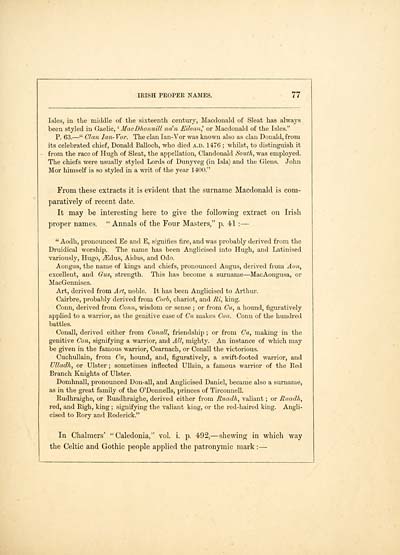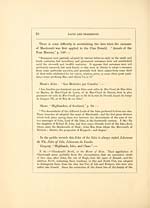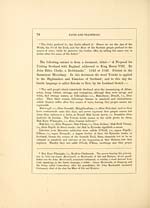Facts and traditions collected for a family record
(89) Page 77
Download files
Complete book:
Individual page:
Thumbnail gallery: Grid view | List view

IRISH PEOPER NAMES. 77
Isles, in the middle of the sixteenth century, Macdonald of Sleat has always
been styled in Gaelic, ' Mac Dhonuill na'n Etteanj or Macdonald of the Isles."
P. 63. — " Clan Ian- Vor. The clan Ian-Vor was known also as clan Donald, from
its celebrated chief, Donald Balloch, who died a.d. 1476 ; whilst, to distinguish it
from the race of Hugh of Sleat, the appellation, Clandonald South, was employed.
The chiefs were usually styled Lords of Dunyveg (in Isla) and the Glens. John
Mor himself is so styled in a writ of the year 1400."
From these extracts it is evident that the surname Macdonald is com-
paratively of recent date.
It may be interesting here to give the following extract on Irish
proper names. " Annals of the Four Masters," p. 41 : —
" Aodh, pronounced Ee and E, signifies fire, and was probably derived from the
Druidical worship. The name has been Anglicised into Hugh, and Latinised
variously, Hugo, iEdus, Aidus, and Odo.
Aongus, the name of kings and chiefs, pronounced Angus, derived from Aon,
excellent, and Gus, strength. This has become a surname — MacAongusa, or
MacGennises.
Art, derived from Art, noble. It has been Anglicised to Arthur.
Cairbre, probably derived from Corb, chariot, and Ri, king.
Conn, derived from Conn, wisdom or sense ; or from Cu, a hound, figuratively
applied to a warrior, as the genitive case of Cu, makes Con. Conn of the hundred
battles.
Conall, derived either from Conall, friendship ; or from Cu, making in the
genitive Con, signifying a warrior, and All, mighty. An instance of which may
be given in the famous warrior, Cearnach, or Conall the victorious.
Cuchullain, from Cu, hound, and, figuratively, a swift-footed warrior, and
Ulladh, or Ulster ; sometimes inflected Ullain, a famous wai'rior of the Red
Branch Knights of Ulster.
Domhnall, pronounced Don-all, and Anglicised Daniel, became also a surname,
as in the great family of the O'Donnells, princes of Tirconnell.
Rudhraighe, or Ruadhraighe, derived either from Ruadh, valiant ; or Raadh,
red, and Righ, king ; signifying the valiant king, or the red-haired king. Angli-
cised to Rory and Roderick."
In Chalmers' " Caledonia," vol. i. p. 492, — shewing in which way
the Celtic and Gothic people applied the patronymic mark : —
Isles, in the middle of the sixteenth century, Macdonald of Sleat has always
been styled in Gaelic, ' Mac Dhonuill na'n Etteanj or Macdonald of the Isles."
P. 63. — " Clan Ian- Vor. The clan Ian-Vor was known also as clan Donald, from
its celebrated chief, Donald Balloch, who died a.d. 1476 ; whilst, to distinguish it
from the race of Hugh of Sleat, the appellation, Clandonald South, was employed.
The chiefs were usually styled Lords of Dunyveg (in Isla) and the Glens. John
Mor himself is so styled in a writ of the year 1400."
From these extracts it is evident that the surname Macdonald is com-
paratively of recent date.
It may be interesting here to give the following extract on Irish
proper names. " Annals of the Four Masters," p. 41 : —
" Aodh, pronounced Ee and E, signifies fire, and was probably derived from the
Druidical worship. The name has been Anglicised into Hugh, and Latinised
variously, Hugo, iEdus, Aidus, and Odo.
Aongus, the name of kings and chiefs, pronounced Angus, derived from Aon,
excellent, and Gus, strength. This has become a surname — MacAongusa, or
MacGennises.
Art, derived from Art, noble. It has been Anglicised to Arthur.
Cairbre, probably derived from Corb, chariot, and Ri, king.
Conn, derived from Conn, wisdom or sense ; or from Cu, a hound, figuratively
applied to a warrior, as the genitive case of Cu, makes Con. Conn of the hundred
battles.
Conall, derived either from Conall, friendship ; or from Cu, making in the
genitive Con, signifying a warrior, and All, mighty. An instance of which may
be given in the famous warrior, Cearnach, or Conall the victorious.
Cuchullain, from Cu, hound, and, figuratively, a swift-footed warrior, and
Ulladh, or Ulster ; sometimes inflected Ullain, a famous wai'rior of the Red
Branch Knights of Ulster.
Domhnall, pronounced Don-all, and Anglicised Daniel, became also a surname,
as in the great family of the O'Donnells, princes of Tirconnell.
Rudhraighe, or Ruadhraighe, derived either from Ruadh, valiant ; or Raadh,
red, and Righ, king ; signifying the valiant king, or the red-haired king. Angli-
cised to Rory and Roderick."
In Chalmers' " Caledonia," vol. i. p. 492, — shewing in which way
the Celtic and Gothic people applied the patronymic mark : —
Set display mode to:
![]() Universal Viewer |
Universal Viewer | ![]() Mirador |
Large image | Transcription
Mirador |
Large image | Transcription
Images and transcriptions on this page, including medium image downloads, may be used under the Creative Commons Attribution 4.0 International Licence unless otherwise stated. ![]()
| Histories of Scottish families > Facts and traditions collected for a family record > (89) Page 77 |
|---|
| Permanent URL | https://digital.nls.uk/95522053 |
|---|
| Description | A selection of almost 400 printed items relating to the history of Scottish families, mostly dating from the 19th and early 20th centuries. Includes memoirs, genealogies and clan histories, with a few produced by emigrant families. The earliest family history goes back to AD 916. |
|---|

